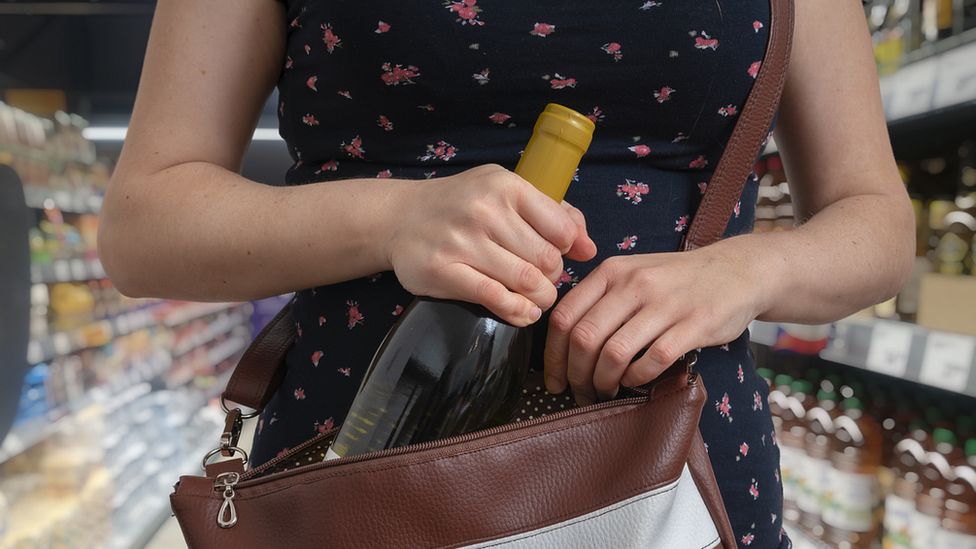
By Eleanor Lawrie
Social affairs reporter, BBC News
Shoplifting offences recorded by police in England and Wales have risen to the highest level in 20 years.
More than 430,000 offences were recorded last year – up by more than a third than the previous 12 months to December 2022, according to the Office for National Statistics (ONS).
This is the highest figure since current police records began in 2003.
Organisations representing retailers say these figures represent a fraction of the true number of incidents.
The latest ONS crime survey said police had also been dealing with unprecedented levels of stealing from individual people, with recorded personal theft at its highest level since 2004.
One retailer from south Wales told the BBC she had lost goods worth tens of thousands of pounds to shoplifting last year and has had to install expensive anti-theft technology to keep her business viable.
Fiona Malone, who has run a convenience store and Post Office in Tenby with her husband Vince for 10 years, said she had placed high value items behind the counter but found that wine, beer and bread kept disappearing from the shop floor.
“Last year we lost about £26,000 in shoplifting, which is huge for us,” she said. “We are a little family-owned business so the impact on our profits was quite significant.
“People think ‘I’ll just take that, I’ll put it in my pocket, it’s only a fiver, it doesn’t matter’ but it has a huge impact on our business.”
Image source, Fiona Malone
Vince and Fiona Malone lost £26,000 worth of goods to shoplifters last year
Ms Malone has invested in AI technology to monitor suspicious activity on the shop floor. All members of staff have headsets that can be used to record interactions with shoppers that can be passed on to police.
“It makes me feel very sad, I trust everybody and I don’t expect people to steal things or be underhand,” she added.
“If someone was really hungry and told me they were struggling we would help them, and then they wouldn’t get a criminal record.”
James Lowman, chief executive of the Association of Convenience Stores which represents local shops, said the official ONS figures were not surprising but represent a “fraction of the true picture of shop theft”.
“The vast majority of incidents that take place end up not being reported because of the time taken to report the crime and the lack of follow up from the police,” he said.
“Thieves are stealing on a regular basis without fear of apprehension, so it’s essential that every police force in the country takes theft seriously, not least because challenging thieves is one of the biggest triggers for abuse of shop workers.”
It found that incidents against retail staff – including racial abuse, sexual harassment, physical assault and threats with weapons – rose by 50% in the year to September 2023.
BRC chief executive Helen Dickinson said: “Thieves have become bolder and more aggressive, and the impact on retail workers is severe, extending far beyond the workplace, affecting their physical and emotional well-being.”
Prime Minister Rishi Sunak said the new law was about “sending a message” to criminals stealing from local businesses or abusing shop workers that “enough is enough”.
Neil Basu, former assistant commissioner of the Metropolitan Police, told a BBC Radio 4 Today programme debate earlier this week that neighbourhood policing models needed to return to tackle shoplifting offences.
“Unfortunately we lost the prioritisation of neighbourhood policing and we have to get that back,” he said.
“That is actually the easiest way to communicate between agencies – through local people who know their communities, who know the people who live there and can help traverse those agencies and communicate between them.”








